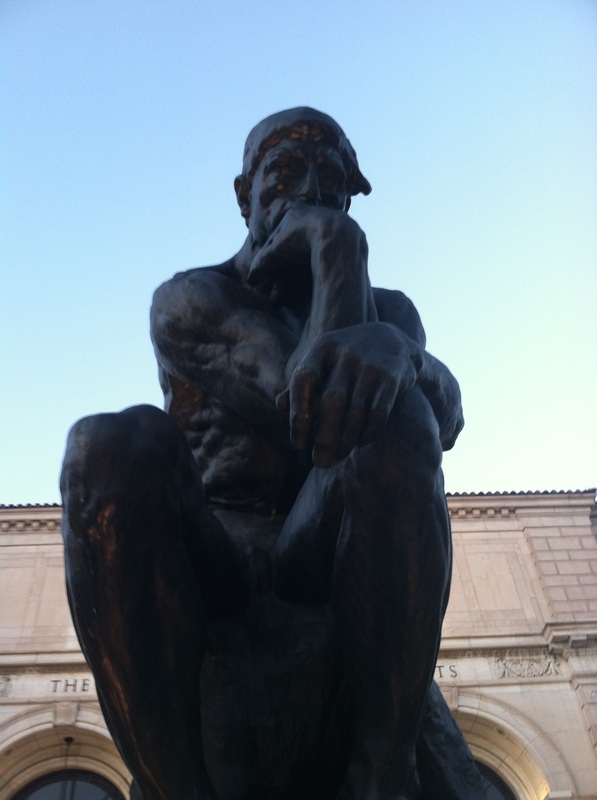Moving towards the façade, I walked up a few stairs and saw one of the 28 replicas of Rodin’s The Thinker, a bronze statue of a man contemplating his life. The first time I saw the original replica at the Auguste Rodin Museum in Paris, the level of profound emotion on his bronze face blew me away. But what was this emotion on his face, exactly? What was he thinking? Was he undergoing severe emotional turbulence or reaching a deep philosophical truth? Nietzsche once said, “If you look into the abyss long enough, the abyss will look back at you.” As I gazed at the second reincarnation of the Thinker, I felt the full force of the abyss. Everything about his facial expression alluded to his struggle to find purpose in chaos: his eyes, downcast and mournful; his hand, absently placed on his chin; his furrowed brows, angered by the injustices of the world. But I soon realized that as I was staring at him, I was simply staring at a reflection of myself. For a brief moment, the Thinker and I were one, intersecting on the twin axes of space and time.
Indeed, I struggle to find meaning in a world with so many problems – poverty, disease, blight, violent crime, injustice – problems endemic to not only Detroit, but to the world and human nature. These are problems that I have little knowledge about besides facts from dusty textbooks; yet, I want to solve these problems using both my heart and my head. I want to reach out to members of the Detroit community and hear their stories to find meaning in my own life.
Like the paper bag drifting in the wind in American Beauty, a thought – perhaps naïvely – drifted in and out of my mind. What if race, ethnicity, gender, class, body type, and other formalities are simply superficial boxes that we foolishly cling to hide their true identity? I imagine a world where the ideas and voice of all people are not just tolerated, but cherished. Like MLK, I imagine a world where individuals are not judged for the color for their skin, but for the content of their character. Humans are not that different, after all.
It’s funny: when I was five, I had no concept of meaning and purpose. I was perfectly content running through the outdoor water fountains and enjoying sunny summer afternoons with my mother. That is the process of growing up – my great hope is to replace the simplicity of my childhood with infinite gratitude and optimism. I want to marvel at the complexity of the world, rather than weep about its shortcomings. And I have a feeling that even Nietzsche cared enough about himself to look away from the abyss for a moment or two.

 RSS Feed
RSS Feed
